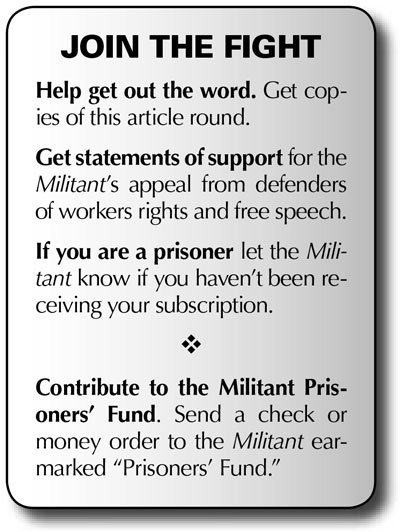

Vol. 77/No. 44 December 9, 2013
The prisoner was among some three dozen subscribers in Florida state prisons affected by an impoundment of the Militant after the paper ran a news article on the mass hunger strike by inmates against solitary confinement and other abuses earlier this year.
Prison authorities informed the Militant they decided Sept. 5 to impound the paper’s July 22 issue because it was a “threat to the security, good order, or discipline of the correctional system.” The following month prison authorities reversed the ban after a public campaign that included an appeal by the Florida American Civil Liberties Union.
“I received the July 22 issue,” wrote the Florida prisoner. “Two days later I was given seven other issues.”
In the course of this battle, the Militant learned about and joined similar fights against censorship in prisons by a number of other publications, including the San Francisco Bay View and Prison Legal News.
The Militant also heard from other prisoners who were not receiving their subscriptions. Among them was Patrick Drum, a prisoner at the Washington State Penitentiary in Walla Walla, who let the paper know in September that prison authorities had taken four issues from him. The issues were resent, but never delivered. On Sept. 25 Drum received a notice that some mail had been rejected as a “threat to the safty [sic] and security of the institution.”
The Washington ACLU agreed to represent the Militant and followed with several calls and then a letter to Assistant Attorney General John Dittman.
The Militant then sent the four issues again. “We expect that [Department of Corrections] will ensure that Mr. Drum receives these issues and will not interfere with The Militant’s First Amendment right to inform and share its opinion with those who are incarcerated,” wrote ACLU staff attorney La Rond Baker Nov. 25.
“The hunger strike was a current event of public importance that was covered by most national and local television networks, cable news providers, and major news magazines and newspapers,” the letter said. “The only conceivable difference between coverage of the protest that was allowed into the facility and The Militant’s articles would be The Militant’s socialist editorial policy. … The First Amendment prohibits governments from censoring speech based on its viewpoint.”
“Publishers have a First Amendment right to communicate with prisoners by mail,” the letter said, “and inmates have a First Amendment right to receive this mail,” quoting from a victory over previous Washington state censorship won by the Prison Legal News.
The Militant’s efforts to defend the right of prisoners to read what they want has been supported and recounted by others concerned with the rights and conditions of workers behind bars.
The San Francisco Bay View prominently displayed a combination of two Militant articles titled “Hunger Strikers Face Reprisals as Papers That Back Them Are Censored” on its website Nov. 17. “The Bay View thanks The Militant for its solidarity and strong opposition to prison censorship,” the paper said.
“The newspapers being censored are the newspapers prisoners love for recognizing their dignity and the righteousness of their cause,” the paper wrote, “and for reporting — often through publishing the writing of prisoners themselves — on the growing movement to stop mass incarceration.”
Prison Legal News reprinted another Militant article, “‘Militant’ Victory Part of Fight Against Prison, Other Censorship.”
“Thanks so much for my paper! I live for information and the strength it gives me,” concluded the Nov. 20 letter from the prisoner in Florida.

|